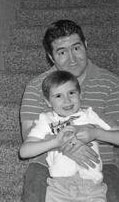Recent studies have shown that as many as 1 out of every 142 children born today will be diagnosed some where on the autism spectrum (ASD). Even now very little is known about the causes of the symptoms associated with ASD. In this episode I interview John Roedel. He shares his family journey with ASD and how they have used EFT in that journey.
 Guest: John Roedel
Guest: John Roedel
Contact Info: John's Blog where John writes regularly about life, the world, and everything in it (esp. about his families journey with ASD).
Bio: John Roedel was born and raised in Cheyenne Wyoming. He is married and has three children. John is a writer, actor, and advocate for autism research.
Links & Resouces From Episode:
- Tools to help parents focus on their emotional struggles
- Every ASD related article on Tapping Q & A


 The history of parenting is rather brutal, with children once considered non-entities that could be discarded, killed, or used at the parent's whim. Over time, our collective approach to parenting is evolving and developing, which is good news indeed. How we collectively parent is the leading force that shapes how we are as a country and as a world. How we parent as a society determines whether we perpetrate violence or encourage peace.
The history of parenting is rather brutal, with children once considered non-entities that could be discarded, killed, or used at the parent's whim. Over time, our collective approach to parenting is evolving and developing, which is good news indeed. How we collectively parent is the leading force that shapes how we are as a country and as a world. How we parent as a society determines whether we perpetrate violence or encourage peace. Show Topic:Getting your head around surrogate tapping with EFT can be difficult (EFT/EvEFT eveft.html). It is hard enough to accept that tapping on the body while tuning into physical and emotional issues can provide relief. It’s a much bigger leap to believe that tapping in the same way on our own body will provide relief for someone else.
Show Topic:Getting your head around surrogate tapping with EFT can be difficult (EFT/EvEFT eveft.html). It is hard enough to accept that tapping on the body while tuning into physical and emotional issues can provide relief. It’s a much bigger leap to believe that tapping in the same way on our own body will provide relief for someone else.



 I would wake up in the middle of the night and…
I would wake up in the middle of the night and…

